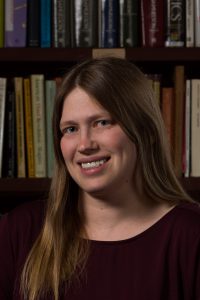 Amanda Tarullo, PhD, is an assistant professor at Boston University and the director of the Brain and Early Experiences Lab. Tarullo earned her PhD from the Institute of Child Development (ICD) while working with Megan Gunnar, PhD, on research with internationally adopted children. Below, Tarullo discusses how her time at ICD prepared her to conduct her own research and educate others in the field.
Amanda Tarullo, PhD, is an assistant professor at Boston University and the director of the Brain and Early Experiences Lab. Tarullo earned her PhD from the Institute of Child Development (ICD) while working with Megan Gunnar, PhD, on research with internationally adopted children. Below, Tarullo discusses how her time at ICD prepared her to conduct her own research and educate others in the field.
How did you know you wanted to study developmental psychology?
I was interning at a school for children with special needs one summer during college, and I met a young girl who had been adopted from a Romanian orphanage. The way she interacted socially was so strikingly unusual, an uninhibited behavior pattern I later learned is called indiscriminate friendliness. I really wanted to understand how her experiences in the orphanage could have led to this behavior. Two years later, I was fortunate to come to ICD to join Dr. Megan Gunnar’s lab and assist in research with internationally adopted children.
What research are you currently working on?
In my lab at Boston University, the Brain and Early Experiences Lab, we study how poverty and parents shape young children’s stress physiology (cortisol) and brain development (EEG activity) in ways that can compromise adaptive child development. In one current project, we are looking at how mothers interact with their infants following a laboratory stressor, to better understand how mothers can effectively buffer their infants from biological stress. Our second main project right now, All Children Thriving, is a collaboration with BU Global Health and researchers in South Africa. In a randomized clinical trial, we are using EEG measures of brain activity to evaluate how a public health intervention affects trajectories of brain development in disadvantaged infants in rural Limpopo, South Africa.
How would you describe your time at the Institute of Child Development?
ICD is a rich scientific environment because so many developmentalists are all together in the same building. I didn’t fully appreciate how rare and valuable that kind of intellectual synergy is until after I had left ICD.
What is something you learned during your time at ICD that you still use today?
I learned how to organize a lab, how to design and conduct careful research, and how to be a mentor from my own phenomenal mentor, Megan Gunnar. Having a successful working model to draw on has helped me enormously now that I have my own lab.
If you could have known one thing before beginning your higher education experience, what would it have been?
Your cohort will likely continue to be a key informal support network in academia long after you leave ICD. Peer mentors are critical at every career stage, and I still rely on the expertise, good judgment, and friendship of fellow ICD grads.
What inspires you to continue your work and research?
I recently got to visit South Africa to set up an EEG lab and train local staff for a research project, which was so exciting. So much developmental research has been conducted with relatively privileged children in the western world—a very unrepresentative sample of the world’s population. I am inspired by the opportunity to contribute to international child development research, especially in low- and middle-income countries. I hope to help make developmental psychology as a discipline more reflective of the global population.
What is a “fun fact” about yourself?
I once was seated next to Cynthia Nixon at a Broadway show.



